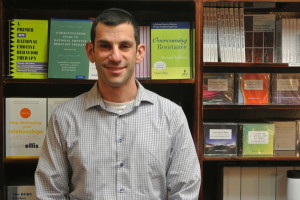by Josh Dredze, Psy.D.
With the summer behind me, well into the academic year, I was able to get into a groove. Between seminars, seeing clients, and research I felt like I was making headway and proceeded full steam ahead. While my weekdays were largely focused on professional pursuits, I began to dedicate more and more of my weekends to career. Slowly, though, I started to lose steam. I felt a bit moody and was losing interest in clinical practice and doing my research. In general, I was more tired. I tried drawing on my cognitive skills to look at my day more optimistically, but my irritability continued to increase.
It was at this moment that I was reminded that I was not being completely true to REBT. I was overlooking the behavior component of REBT. Dr. Ellis not only developed a structured, nuanced, in-depth approach to address our beliefs, but he designed a therapy for behavior as well. For some, the behavior of REBT is exposure to a feared stimulus. For others, it may be speaking up in a social setting. For me, at this point, it was taking a break. While I was mindful of my cognitive skills, I let my behavioral maintenance falloff. I realized I needed to integrate a better behavioral approach to managing my everyday stress.
With the upcoming holidays, we have such an opportunity. Breaks from work force us to interrupt our daily routine and escape from stress. However, the REBT model teaches us that such time off and self-care can be integrated on a more consistent basis. While holidays are set times to attend to ourselves, cultivating regular opportunities to recharge our batteries can enhance our professional pursuits throughout the year. During this holiday season, with time away from work, we can enjoy family and non-routine pleasures. In applying this method throughout the year, we can truly practice a holistic REBT approach in ensuring our beliefs and behaviors are consistent with a mentally healthy lifestyle.

